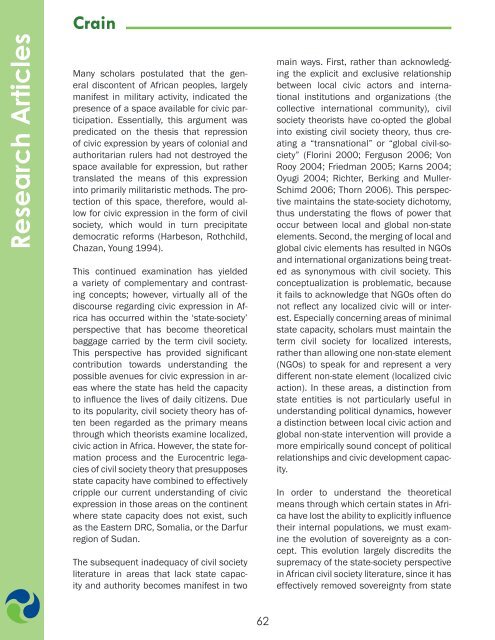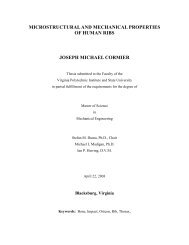Research Articles - VTechWorks - Virginia Tech
Research Articles - VTechWorks - Virginia Tech
Research Articles - VTechWorks - Virginia Tech
Create successful ePaper yourself
Turn your PDF publications into a flip-book with our unique Google optimized e-Paper software.
<strong>Research</strong> <strong>Articles</strong><br />
Crain<br />
Many scholars postulated that the general<br />
discontent of African peoples, largely<br />
manifest in military activity, indicated the<br />
presence of a space available for civic participation.<br />
Essentially, this argument was<br />
predicated on the thesis that repression<br />
of civic expression by years of colonial and<br />
authoritarian rulers had not destroyed the<br />
space available for expression, but rather<br />
translated the means of this expression<br />
into primarily militaristic methods. The protection<br />
of this space, therefore, would allow<br />
for civic expression in the form of civil<br />
society, which would in turn precipitate<br />
democratic reforms (Harbeson, Rothchild,<br />
Chazan, Young 1994).<br />
This continued examination has yielded<br />
a variety of complementary and contrasting<br />
concepts; however, virtually all of the<br />
discourse regarding civic expression in Africa<br />
has occurred within the ‘state-society’<br />
perspective that has become theoretical<br />
baggage carried by the term civil society.<br />
This perspective has provided significant<br />
contribution towards understanding the<br />
possible avenues for civic expression in areas<br />
where the state has held the capacity<br />
to influence the lives of daily citizens. Due<br />
to its popularity, civil society theory has often<br />
been regarded as the primary means<br />
through which theorists examine localized,<br />
civic action in Africa. However, the state formation<br />
process and the Eurocentric legacies<br />
of civil society theory that presupposes<br />
state capacity have combined to effectively<br />
cripple our current understanding of civic<br />
expression in those areas on the continent<br />
where state capacity does not exist, such<br />
as the Eastern DRC, Somalia, or the Darfur<br />
region of Sudan.<br />
The subsequent inadequacy of civil society<br />
literature in areas that lack state capacity<br />
and authority becomes manifest in two<br />
62<br />
main ways. First, rather than acknowledging<br />
the explicit and exclusive relationship<br />
between local civic actors and international<br />
institutions and organizations (the<br />
collective international community), civil<br />
society theorists have co-opted the global<br />
into existing civil society theory, thus creating<br />
a “transnational” or “global civil-society”<br />
(Florini 2000; Ferguson 2006; Von<br />
Rooy 2004; Friedman 2005; Karns 2004;<br />
Oyugi 2004; Richter, Berking and Muller-<br />
Schimd 2006; Thorn 2006). This perspective<br />
maintains the state-society dichotomy,<br />
thus understating the flows of power that<br />
occur between local and global non-state<br />
elements. Second, the merging of local and<br />
global civic elements has resulted in NGOs<br />
and international organizations being treated<br />
as synonymous with civil society. This<br />
conceptualization is problematic, because<br />
it fails to acknowledge that NGOs often do<br />
not reflect any localized civic will or interest.<br />
Especially concerning areas of minimal<br />
state capacity, scholars must maintain the<br />
term civil society for localized interests,<br />
rather than allowing one non-state element<br />
(NGOs) to speak for and represent a very<br />
different non-state element (localized civic<br />
action). In these areas, a distinction from<br />
state entities is not particularly useful in<br />
understanding political dynamics, however<br />
a distinction between local civic action and<br />
global non-state intervention will provide a<br />
more empirically sound concept of political<br />
relationships and civic development capacity.<br />
In order to understand the theoretical<br />
means through which certain states in Africa<br />
have lost the ability to explicitly influence<br />
their internal populations, we must examine<br />
the evolution of sovereignty as a concept.<br />
This evolution largely discredits the<br />
supremacy of the state-society perspective<br />
in African civil society literature, since it has<br />
effectively removed sovereignty from state



